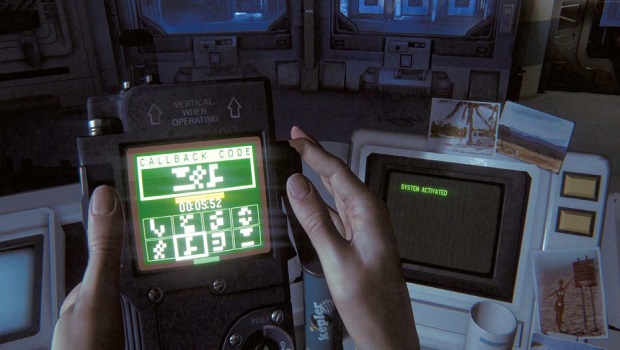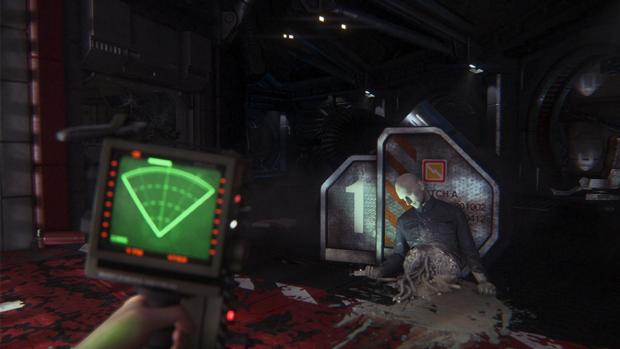I think it’s fair to say that most people have a love/hate relationship with technology. On the one hand having a computer and the internet in your pocket is fantastic. On the other, the internet in my pocket means I can never get away from work/the general rubbish that springs forth from the internet. Alien: Isolation stretches this relationship firmly into the hateful area. “Where’s the bloody scrap of paper with the wifi code on it?!” I yell at no one in particular. “Not another bloody key card!,” I imagine Amanda Ripley sighing in exasperation. Amanda, we’re not so different, you and I.
The portrayal of technology in Alien: Isolation is rather fantastic. No matter what you think of the game, there is no denying that the dark industrial future aesthetic of Ridley Scott’s original film has been carried over flawlessly. If you haven’t already done so, I’d urge you to read Edward Smith’s excellent take on it:
Technology is a character in Isolation, insofar as it has a complex relationship to the player. It’s essential – you need your tools and the station’s various emergency protocols and computers to survive – but it’s also a detriment.
He’s not wrong. Very early on I was very much taken by the tediousness of the technology on display. For the most part it doesn’t actively seek to hinder you; it just acts in that obtuse way that technology does, turning seemingly simple tasks into Herculean feats of willpower. Key cards, pass-codes, rebooting systems, and power failures. We’ve all been there in some form or another. While we might be stumped for some time over network errors, in Isolation we are at least in control of an engineer who knows her craft, with every problem presenting a solution under Ripley’s experienced gaze.
Nothing makes this ring more true than the various hacking routines the player undertakes throughout the course of the game. Actually I love the hacking in Alien: Isolation. I’m writing this piece solely as an excuse to talk about it. It encompasses everything the game says about technology.
Shortly after arriving on the space station Sevastopol, you “liberate” the hacking device from a group of survivors. The group don’t seem too upset about the loss of the device, it being broken and all that jazz. Picking it up, Ripley immediately identifies the problem, and so we go off in search of the McGuffin to fire it into life.
Just like everything else in the game, it is an obtuse piece of kit. It will open some doors, but not others. If a door needs a key card you will need to find that key card. If a lock requires you to input a combination of numbers, you cannot simply jack this thing directly into the mainframe and bypass that. While it frequently offers you passage, the device does so on its own terms. It will work on some things but not others. Perhaps it needs a driver update?
Even the act hacking works against the player. In Watch_Dogs, another recent game revolving around hacking (Hack the city! HACK IT!), the act of this central mechanic is mapped to the press of a button. It is something the player can do at ease, and so it becomes a meaningless bauble that does nothing to inform the intertwining of narrative and play.
Hacking in Alien: Isolation has the player, and Ripley, fight against and overcome Sevastopol’s systems. It is not a magic button that grants access to all areas. Finding a door you can hack brings up a rather neat little puzzle in which you must tune in to its frequency and then, under a time limit, match a sequence of shapes using a selection of displaced symbols.
One of the earliest instances of this (if not the earliest) has you hacking a door while the Xenomorph stalks and kills the group of survivors from whom you took your hacking device from. Having the air fill with screams, growls and gunfire while all of your attention is fixed on negotiating a small neon screen is genuinely exhilarating, and furthers the narrative that your character is an experienced engineer. She was able to overcome this obstacle in the very midst of the chaos happening around her. The system isn’t actually that difficult to get the hang of, but it enforces the idea that you are overcoming technology that is simply doing what it was programmed to do. You are the outsider, the space spanner in the works.
Funnily enough reminds me of my time spent with Alpha Protocol. That game had a hacking aspect too, and by all accounts not many people enjoyed it (however no one seemed to enjoy Alpha Protocol very much either, so what do they know, really?). In the criminally under-appreciated Alpha Protocol you were tasked with matching two sets of numbers and letters from a jumbled grid of them. Spotting them could be tricky, given the sometimes strict time limit. Yet it enforced the idea of hacking. Why are you hacking something? To get at something you’re not allowed to access. Hacking should not be easy. You are forcefully trying to gain access to a system that has been designed to keep you out.
By making it so easy is Watch_Dogs making some statement about the easy availability of your data? Perhaps, or more likely the developers just didn’t think very hard about the nature of the mechanic they were shoehorning into their open world game, to stand out from the crowd. Disagree all you want, but I’ll just point to Alien: Isolation as a game that creates a meaningful relationship with technology. There’s no reason why other games can’t do the same.


